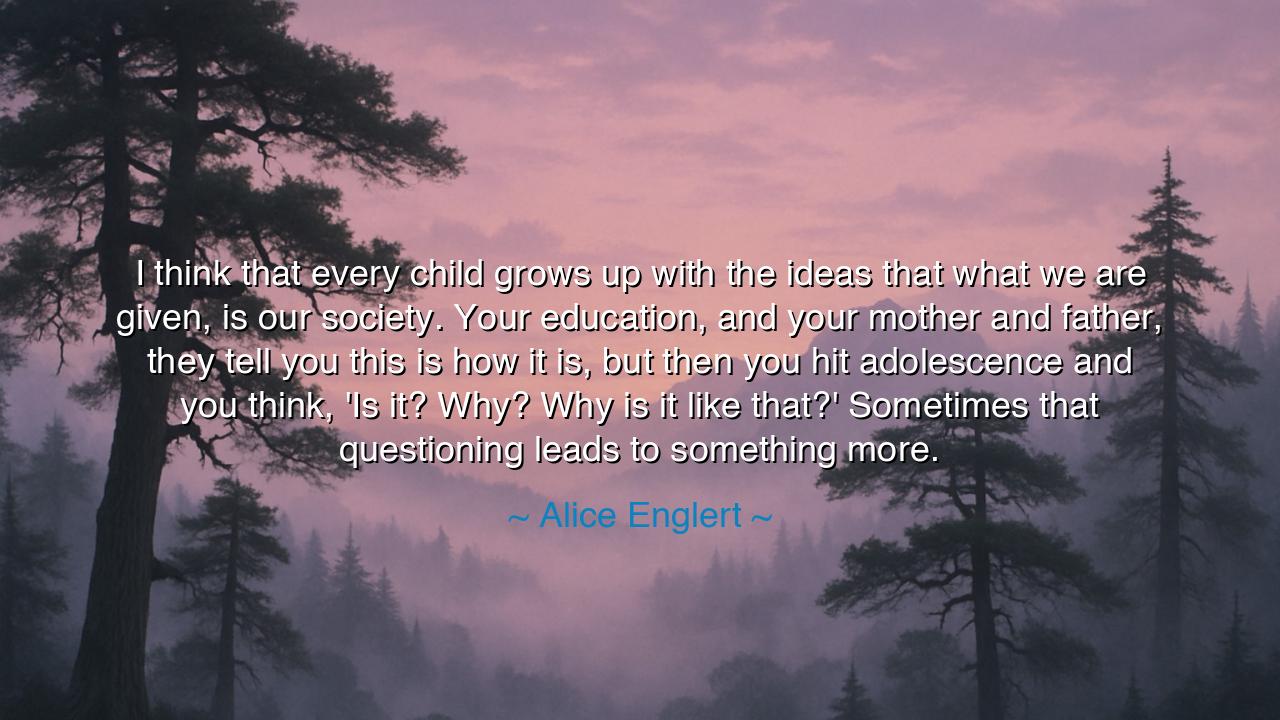
I think that every child grows up with the ideas that what we are
I think that every child grows up with the ideas that what we are given, is our society. Your education, and your mother and father, they tell you this is how it is, but then you hit adolescence and you think, 'Is it? Why? Why is it like that?' Sometimes that questioning leads to something more.






Alice Englert, with the clear voice of one who has reflected upon the journey of growing, once declared: “I think that every child grows up with the ideas that what we are given, is our society. Your education, and your mother and father, they tell you this is how it is, but then you hit adolescence and you think, ‘Is it? Why? Why is it like that?’ Sometimes that questioning leads to something more.” In these words lies the story of all who have ever awakened from innocence to awareness, from obedience to independence, from unquestioned acceptance to the daring of thought.
The meaning of her words is that every child begins life in the circle of family and culture. We inherit beliefs, customs, and truths as if they were eternal. We are told, “This is the way of things.” Yet the fire of adolescence is the fire of doubt, the moment when the mind opens its eyes and asks, “But why? Who said so? Must it always be thus?” It is in this sacred rebellion that humanity renews itself. Without it, societies grow stagnant; with it, new paths and new freedoms are forged.
The origin of this wisdom is found not in books but in the universal human experience. Every civilization has watched its youth struggle with the boundaries of tradition. It is a necessary struggle, for questioning is the seed of progress. Alice Englert’s words echo the voices of philosophers and revolutionaries across history, who once were children taught “this is how it is,” and who grew into thinkers who asked, “But could it be otherwise?”
Consider the story of Siddhartha, the prince of ancient India. As a child, he was taught that life within the palace was paradise, shielded from suffering and decay. His education was crafted to show him only luxury, only joy. Yet when he reached adolescence, he saw sickness, old age, and death for the first time. He asked, “Is this the truth of life? Why must it be so?” That questioning led him beyond his father’s palace, into years of seeking, until he became the Buddha, bearer of a wisdom that reshaped the spiritual destiny of millions.
History speaks again in the voice of Galileo Galilei. As a boy, he was taught the teachings of Aristotle and the Church—that the sun circled the earth, that the heavens were perfect. Yet as a young man, he raised his telescope and asked, “Is it?” His questioning revealed moons circling Jupiter, mountains on the moon, and stars beyond counting. For this, he faced trial and condemnation. Yet his courage to doubt what he was given by society transformed the course of science forever.
Englert’s words carry a lesson not only for the great but for every soul. To question what is handed to us is not betrayal—it is fidelity to truth. Our parents and teachers give us a foundation, but they cannot give us the whole edifice. It is for each generation to ask new questions, to peel away what is false, to deepen what is true. Without questioning, we remain children all our lives. With it, we grow into beings capable of shaping destiny.
So what must you do? When you feel the stirrings of doubt, do not silence them. Ask boldly: “Why is this so?” Read widely, listen deeply, test what you are told against the measure of reason and compassion. Do not despise your education or the wisdom of your parents, but do not let them be the prison of your mind. Let your questioning lead you beyond imitation into creation, beyond tradition into truth.
Thus, remember Alice Englert’s words: “Every child grows up with the ideas that what we are given, is our society … but then you hit adolescence and you think, ‘Is it? Why?’” Let them be your inheritance. For the world you were given is not the final world. Each question you dare to ask is a hammer strike upon the walls of limitation, and each answer you seek may open the gates to “something more.”






AAdministratorAdministrator
Welcome, honored guests. Please leave a comment, we will respond soon